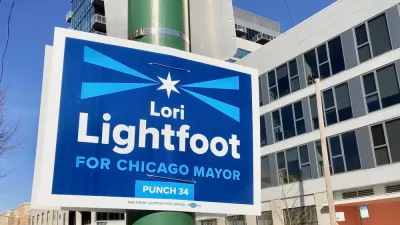A Chicago City Council vote to approve tax increment financing for the massive Lincoln Yards redevelopment proposal scored a surprising reversal and a big win for outgoing Mayor Rahm Emanuel, with an assist from Mayor-elect Lori Lightfoot.

Last week, the Chicago City Council approved $2 billion in tax increment financing for the Lincoln Yards mega-development only 48 hours after outgoing Mayor Rahm Emanuel announced intentions to delay the vote to honor the desires of Mayor-elect Lori Lightfoot. The latter's election was considered in small part a referendum on the project, given her public questioning of the project.
Shia Kapos and Arienne Hurst report that Mayor-elect Lightfoot was able to negotiate a few changes for the development, signing off on the agreement and helping clear the way for the City Council vote before taking office in May. More from Kapos and Hurst on Mayor-elect Lightfoot's public announcements on the project before last week's council vote:
“I am appreciative” of Emanuel and Finance Committee Chairman Patrick O’Connor “agreeing to defer Monday’s vote,” Lightfoot said in the statement, adding that after “subsequent discussions” with the mayor, community stakeholders and a number of aldermen “we expect that this deal is likely to pass.”
Lightfoot said she also had “productive meetings” with the Sterling Bay and Related Midwest development team. As a result of those conversations, the mayor-elect says “developers agreed to meaningfully strengthen their commitments to minority-owned and women-owned business enterprises” from $80 million to $400 million overall participation and that they would comply with “explicit controls” for the city to measure and require compliance. “These changes represent a vital sign that my administration will be able to make progress toward an equitable and fair deal for our communities.”
For additional background on the project, and the TIF that will help finance it, see also coverage by Jay Koziarz.
FULL STORY: BREAKING: LIGHTFOOT says yes to Lincoln Yards, 78 — BUTTIGIEG likes Chicago — PRITZKER rallies unions

Alabama: Trump Terminates Settlements for Black Communities Harmed By Raw Sewage
Trump deemed the landmark civil rights agreement “illegal DEI and environmental justice policy.”

Study: Maui’s Plan to Convert Vacation Rentals to Long-Term Housing Could Cause Nearly $1 Billion Economic Loss
The plan would reduce visitor accommodation by 25% resulting in 1,900 jobs lost.

Why Should We Subsidize Public Transportation?
Many public transit agencies face financial stress due to rising costs, declining fare revenue, and declining subsidies. Transit advocates must provide a strong business case for increasing public transit funding.

Paris Bike Boom Leads to Steep Drop in Air Pollution
The French city’s air quality has improved dramatically in the past 20 years, coinciding with a growth in cycling.

Why Housing Costs More to Build in California Than in Texas
Hard costs like labor and materials combined with ‘soft’ costs such as permitting make building in the San Francisco Bay Area almost three times as costly as in Texas cities.

San Diego County Sees a Rise in Urban Coyotes
San Diego County experiences a rise in urban coyotes, as sightings become prevalent throughout its urban neighbourhoods and surrounding areas.
Urban Design for Planners 1: Software Tools
This six-course series explores essential urban design concepts using open source software and equips planners with the tools they need to participate fully in the urban design process.
Planning for Universal Design
Learn the tools for implementing Universal Design in planning regulations.
Smith Gee Studio
Alamo Area Metropolitan Planning Organization
City of Santa Clarita
Institute for Housing and Urban Development Studies (IHS)
City of Grandview
Harvard GSD Executive Education
Toledo-Lucas County Plan Commissions
Salt Lake City
NYU Wagner Graduate School of Public Service




























